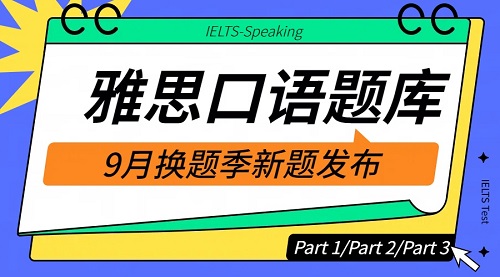2024年9-12月雅思口语Part3新题汇总
彭静 2024-09-05 11:53:04
雅思口语题库9月换题已经开始,羊驼雅思整理了Part3双向讨论部分的新题汇总如下,已经报考2024年9月雅思口语考试的考生可以参考新题复习。

2024年9-12月雅思口语题库Part3新题汇总如下表所示。已经报名9月雅思考试的烤鸭们可以免费参加羊驼雅思口语换题季训练营,训练营时间:9月5日-9月10日,共6天,期间老师每日直播带练, 口语老师免费指导、点评,参与口语打卡更有机会免费获得【剑19精讲解析】【免费1v1课程】【口语技巧课18节】【羊驼雅思vip】。24年9月雅思口语新题完整内容查看2024年9-12月雅思口语新题库更新汇总
2024年9月雅思口语新题Part3汇总
| 医疗人士 | |
| 1. Do you think doctors and nurses are very important? | 1.你认为医生和护士很重要吗? |
| 2. Who is more important, doctors or nurses? | 2.医生和护士,谁更重要? |
| 3. Do you think that doctors and nurses are not paid enough? | 3.你认为医生和护士的工资不够吗? |
| 4. Do you think it is necessary to learn first aid skills? | 4.你认为学习急救技能有必要吗? |
| 5.What are the differences between the work of a doctor and a nurse? | 5.医生和护士的工作有什么不同? |
| 6.Can a hospital function effectively without nurses? | 6.没有护士,医院能有效运转吗? |
| 认识的老人 | |
| 1. What do you think people like to do when they are old? | 1. 你认为人们老了以后喜欢做什么? |
| 2. Do you think grandparents can always have a good relationship with their grandchildren? | 2. 你认为祖父母和孙辈的关系总是很好吗? |
| 3. What can grandparents and grandchildren learn from each other? | 3. 祖父母和孙子可以互相学习什么? |
| 4. Do you think children's parents enjoy living with the grandparents in the family? Why? | 4. 你认为孩子的父母喜欢和祖父母住在一起吗?为什么? |
| 喜欢做手工的人 | |
| 1. Are traditional handicrafts important to tourism? | 1. 传统手工艺品对旅游业重要吗? |
| 2. What are the benefits for students to learn to make things by hand? | 2. 学生学习手工制作有什么好处? |
| 3. Why do many children like to make things by hand? | 3. 为什么许多孩子喜欢手工制作东西? |
| 4. How important are traditional handicrafts to a country's industry? | 4. 传统手工艺对一个国家的工业有多重要? |
| 5.ls it reasonable to charge a high price for handmade things? | 5.手工制品要价高合理吗? |
| 6.How does modern technology change the handicraft industry? | 6.现代科技如何改变手工业? |
| 读书迷 | |
| 1.Why are many people so keen on reading? | 1. 为什么许多人如此热衷于阅读? |
| 2.Do you think parents should help their children develop the reading habit from an early age? | 2. 你认为父母应该帮助孩子从小养成阅读习惯吗? |
| 3.ls reading for fun or for work? | 3. 读书是为了娱乐还是为了工作? |
| 4.What reading topics are popular in your country? | 4.你们国家流行什么阅读主题? |
| 5.What are the differences between paper books and movies? | 5.纸质书和电影有什么不同? |
| 6.Do you think people of all ages need to read? | 6.你认为所有年龄段的人都需要读书吗? |
| 给建议的人 | |
| 1. Do you follow the advice of your family members? | 1. 你会听从家人的建议吗? |
| 2. Who should people ask for advice on big issues,family members or friends? | 2. 在重大问题上,人们应该向谁寻求建议,家人还是朋友? |
| 3.Do people often ask for advice from professional people, like a lawyer? | 3.人们经常向专业人士(比如律师)寻求建议吗? |
| 4. Why do some people like to ask others for advice on almost everything? | 4. 为什么有些人几乎什么事都喜欢向别人征求意见? |
| 5. Do you think the advice parents give their children is always good? | 5. 你认为父母给孩子的建议总是好的吗? |
| 6.Are professional consultancy services expensive in your country? | 6.在你们国家,专业咨询服务贵吗? |
| 近期看的电影 | |
| 1.What kinds of movies do you think are successful in your country? | 1.你认为什么样的电影在你的国家是成功的? |
| 2.What are the factors that make a successful movie? | 2.一部成功电影的要素是什么? |
| 3.Do Chinese people prefer to watch domestic movies or foreign movies? | 3.中国人更喜欢看国产电影还是外国电影? |
| 4.Do you think only well-known directors can create the best movies? | 4.你认为只有知名导演才能拍出最好的电影吗? |
| 5.Do you think successful movies should have well-known actors or actresses in leading roles? | 5.你认为成功的电影应该由知名演员主演吗? |
| 6.Why do people prefer to watch movies in the cinema? | 6.为什么人们更喜欢在电影院看电影? |
| 昂贵物品 | |
| 1.Do people spend too much time shopping these days? why? | 1.现在人们花太多时间购物了吗?为什么? |
| 2.Why do people buy very expensive things? | 2.为什么人们买非常昂贵的东西? |
| 特别的照片 | |
| 1.Who would take photos more often, young people or older people? | 1.谁更常拍照,年轻人还是老年人? |
| 2.What do young people and old people like to take photos of? | 2.年轻人和老年人喜欢拍什么? |
| 3.Why do some people pay a ton of money to hire professional photographers to take photos at some special occasions, such as weddings? | 3.为什么有些人会花很多钱聘请专业摄影师在一些特殊场合拍照,比如婚礼? |
| 传统节日的食物 | |
| 1.Do people in your country grow plants at home? | 1.你们国家的人在家种植植物吗? |
| 2.What plants can people grow in cities? | 2.人们可以在城市里种什么植物? |
| 3.Are there any difficulties when people grow plants in cities? | 3.人们在城市里种植植物有什么困难吗? |
| 4.Do most people prefer vegetables bought from the supermarket or grown at home? | 4.大多数人喜欢从超市买的蔬菜还是自己种的蔬菜? |
| 5.Why do people like to have a big meal at traditional festivals or big events? | 5.为什么人们喜欢在传统节日或大型活动中吃一顿大餐? |
| 6.ls it bad behavior for people to look at their phones during a meal? | 6.吃饭时看手机是不好的行为吗? |
| 理想房屋 | |
| 1.What are apartments like in your country? | 1.你们国家的公寓是什么样的? |
| 2.Why are apartments welcome in some places while not in other places? | 2.为什么公寓在一些地方受欢迎,而在另一些地方不受欢迎? |
| 3.What would people normally consider when they rent or buy a house or an apartment? | 3.人们在租房或买房时通常会考虑什么? |
| 4.Do different people have different preferences for houses or apartments? | 4.不同的人对房子或公寓有不同的偏好吗? |
| 5.Why do some people choose to live in the city center? | 5.为什么有些人选择住在市中心? |
| 6.What do you think buildings will be like in the future? | 6.你认为未来的建筑会是什么样子? |
| 拥挤地方 | |
| 1.Which cities are crowded in your country? | 1.你们国家哪些城市最拥挤? |
| 2.Will there be more or less green space in cities in the future? | 2.未来城市的绿地会多还是少? |
| 3.Will people use bikes more or less in cities in the future? | 3.未来城市里人们会更多还是更少地使用自行车? |
| 4.Why do people go to crowded places? | 4.人们为什么要去拥挤的地方? |
| 5.Do you think there are some people who enjoy crowded places? | 5.你认为有些人喜欢拥挤的地方吗? |
| 6.Do you think it is a good trend to have more big cities? | 6.你认为有更多的大城市是一个好的趋势吗? |
| 文化之地 | |
| 1.How does the internet affect culture? | 1.互联网是如何影响文化的? |
| 2.How is a culture formed? | 2.文化是如何形成的? |
| 3.What kind of culture is popular among the young? | 3.年轻人中流行什么样的文化? |
| 4.How do young people learn about different cultures? | 4.年轻人如何了解不同的文化? |
| 5.Which is more important in terms of culture,literature or music? | 5.就文化而言,文学和音乐哪个更重要? |
| 6.Does the culture of the past have an impact on today's culture? | 6.过去的文化对今天的文化有影响吗? |
| 别人家的房间 | |
| 1.Do you like to invite your friends to your home? | 1.你喜欢邀请你的朋友来你家吗? |
| 2.Why do people often take gifts with them when they visit others homes? | 2.为什么人们在拜访别人家的时候经常带着礼物? |
| 3.Who likes to stay at home more, young people or old people? | 3.年轻人和老年人,谁更喜欢呆在家里? |
| 4.Do you think old people will be able to keep up with the pace of technology in 50 years? | 4.你认为50年后老年人还能跟上科技的步伐吗? |
| 5.Who likes to stay at home more, young people or old people? | 5.年轻人和老年人,谁更喜欢呆在家里? |
| 6.Do you think old people will be able to keep up with the pace of technology in 50 years? | 6.你认为50年后老年人还能跟上科技的步伐吗? |
| 公园/花园 | |
| 1.ls it necessary to have public parks in cities? | 1.城市里有必要有公园吗? |
| 2.What facilities are needed in a park? | 2.公园里需要什么设施? |
| 3.What are the differences between a garden and a natural area? | 3.花园和自然区域有什么区别? |
| 4.Why do people like to visit tourist attractions? | 4.为什么人们喜欢参观旅游景点? |
| 5.What tourist attractions are popular in China? | 5.中国有哪些热门旅游景点? |
| 6.How can we encourage young people to go to parks more often? | 6.我们怎样才能鼓励年轻人多去公园呢? |
| 想和亲友去的地方 | |
| 1.What are the differences between big cities and small cities? | 1.大城市和小城市有什么不同? |
| 2.Where do people in your hometown like to go? | 2.你家乡的人喜欢去哪里? |
| 3.What are the differences between the places young people like to go and the places old people like to go? | 3.年轻人喜欢去的地方和老年人喜欢去的地方有什么不同? |
| 4.What do young people like to do in their leisure time? | 4.年轻人在闲暇时间喜欢做什么? |
| 5.Do you think it is necessary to visit the same place many times? | 5.你认为有必要多次参观同一个地方吗? |
| 6.What factors attract people to go to visit other places other than their hometown? | 6.什么因素吸引人们到家乡以外的地方旅游? |
| 看到野生动物的地方 | |
| 1.Why are most children interested in wild animals? | 1.为什么大多数孩子对野生动物感兴趣? |
| 2.Should parents take their children to see wild animals? | 2.父母应该带孩子去看野生动物吗? |
| 3.Are wild animals easy to spot? | 3.野生动物容易被发现吗? |
| 4.Are there many wildlife documentaries produced in your country? | 4.你们国家有很多野生动物纪录片吗? |
| 5.What impacts does only seeing wild animals in zoos have on children's understanding of these animals? | 5.只在动物园里看野生动物对孩子们对这些动物的认识有什么影响? |
| 6.Which is the better way to see wildlife, watching documentaries or going into the wild? | 6.看纪录片和走进野外,哪一种方式更好看野生动物? |
| 遇到困难挑战 | |
| 1.What do children often do when they face a challenge? | 1.当孩子们面临挑战时,他们通常会做什么? |
| 2.ls it easy for children to overcome a challenge? | 2.孩子们容易克服挑战吗? |
| 3.Do most people choose to face a challenge alone or with others? | 3.大多数人选择独自面对挑战还是与他人一起面对挑战? |
| 4.What activities do you think would make children feel challenged? Why? | 4.你认为哪些活动会让孩子们感到挑战?为什么? |
| 5.What challenges would people face when learning new sports? | 5.人们在学习新的运动项目时会面临哪些挑战? |
| 6.Why do some people enjoy doing extreme sports? | 6.为什么有些人喜欢做极限运动? |
| 获奖 | |
| 1.Do you think competition is all about the prize? | 1.你认为竞争就是为了奖品吗? |
| 2.What prizes should schools set for students? | 2.学校应该为学生设立什么样的奖励? |
| 3.What criteria should be set for students to win a particular prize? | 3.学生获得特定奖项的标准是什么? |
| 4.Why do many companies offer prizes to their customers? | 4.为什么许多公司给他们的顾客提供奖品? |
| 5.Why do many companies offer prizes to their customers? | 5.为什么许多公司给他们的顾客提供奖品? |
| 6.Why do some companies encourage employees to compete with each other? | 6.为什么有些公司鼓励员工相互竞争? |
| 丢失贵重物品 | |
| 1.What kinds of things do people lose easily? | 1.人们最容易失去的东西是什么? |
| 2.Why do people keep losing things? | 2.为什么人们总是丢东西? |
| 3.Where do people often find things they have lost? | 3.人们经常在哪里找到他们丢失的东西? |
| 4.ls it important to be organised for a good student? | 4.对一个好学生来说,有条理很重要吗? |
| 5.Are there any good ways to remind us not to forget or lose things? | 5.有没有什么好方法可以提醒我们不要忘记或丢失东西? |
| 6.ls it important for students to be organized? | 6.学生有条理很重要吗? |
| 帮助亲人 | |
| 1.How can children help their parents at home? | 1.孩子如何在家帮助父母? |
| 2.Should parents always help their children with everything? | 2.父母应该总是帮助孩子做任何事情吗? |
| 3.What can children learn by helping others? | 3.孩子们能从帮助别人中学到什么? |
| 4.Do neighbours often help each other in your country? | 4.在你们国家邻居们经常互相帮助吗? |
| 5.Do neighbours often help each other in your country? | 5.在你们国家邻居们经常互相帮助吗? |
| 6.How do people know that their neighbours might need help? | 6.人们怎么知道他们的邻居可能需要帮助? |
| 优质服务 | |
| 1.Why should companies react quickly when customers have difficulties? | 1.当客户遇到困难时,公司为什么要迅速做出反应? |
| 2.What are the advantages and disadvantages of shopping in small shops? | 2.在小商店购物的优点和缺点是什么? |
| 3.Why do some people dislike shopping in small shops? | 3.为什么有些人不喜欢在小商店购物? |
| 4.What are the differences between online shopping and in-store shopping? | 4.网上购物和实体店购物有什么区别? |
| 5.What are the advantages and disadvantages ofshopping online? | 5.网上购物的优点和缺点是什么? |



